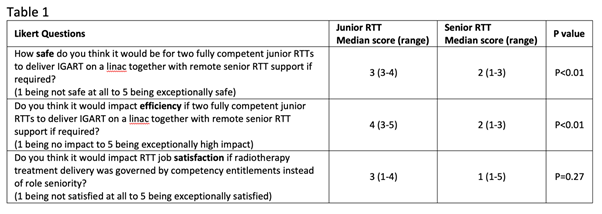Exploring RTT perceptions of image-guided adaptive radiotherapy competency framework against role seniority
PD-0657
Abstract
Exploring RTT perceptions of image-guided adaptive radiotherapy competency framework against role seniority
Authors: Daniel Megias1, Louise Codd1, Yatman Tsang1
1Mount Vernon Cancer Centre, Radiotherapy, London, United Kingdom
Show Affiliations
Hide Affiliations
Purpose or Objective
Rapid advancements in radiotherapy technology and techniques, particularly with the implementation of image-guided adaptive radiotherapy (IGART) strategies have necessitated the development of radiation therapist (RTT) specific competency-based training frameworks. The RTT scopes of practice can be heavily dependent on the achievements of competencies instead of the seniority of their roles. Against this background, this study aims to explore the RTT perceptions of a IGART competency-based training framework against role seniority and understandings of different competency proficiency levels in our institution.
Material and Methods
A bespoke reflective training session on the concepts of competency and proficiency was designed and delivered by a senior RTT who was specialised in education and training. Staff who attended the training sessions were asked to complete a post training survey. The survey was structured on a virtual scenario of two fully competent junior RTT to deliver IGART side by side with remote senior RTT support as required; it was comprised of Likert and open-ended questions around the themes of safety, efficiency and job satisfaction for collecting opinions on working in a competency-driven RT department. A Mann Whitney test was used to determine if there were any significant differences in the scores of Likert questions between the junior and senior RTTs.
Results
16 RTTs (7 junior and 9 senior) attended the training session and completed post training survey. As demonstrated in table 1, there were statistically significant differences in scoring under safety and efficiency themes between the junior and senior RTT groups (p<0.01).
There was general unease from the senior RTTs on the issue allowing junior RTTs to work together, even if they were to hold sufficient IGART competency. Senior RTTs were more likely to perceive junior RTTs working together as being unsafe and leading to minimal gains in efficiency. In contrast junior RTTs felt that there were more positive aspects with a competency-driven RT department in terms of personal development. There was a lack of understanding of different levels of competency proficiency levels (being developed, basic, intermediate, advanced and expert) among the attendees.

Conclusion
Findings indicated mixed perceptions on the possible benefits and concerns of allowing junior RTTs to work together in IGART treatment delivery, with senior RTTs more likely to view it as a negative change. Further investigation of the potential for reducing our reliance on role seniority is required in light of (i) increased competency and proficiency assessments and (ii) co-creation of working practices, with the aim to enhance patient care and departmental efficiency.